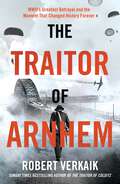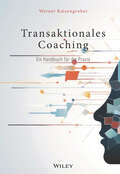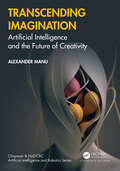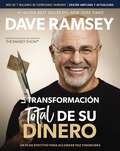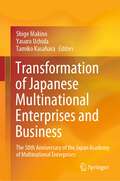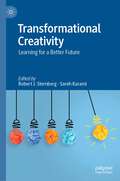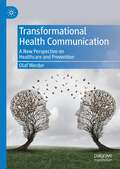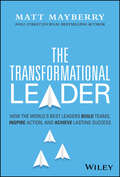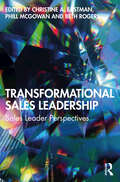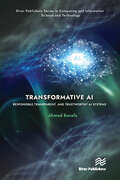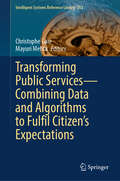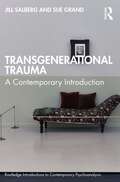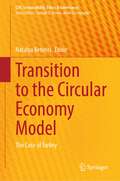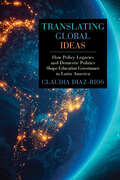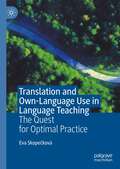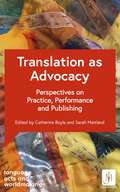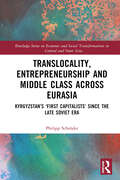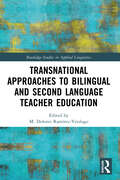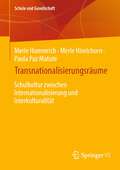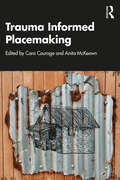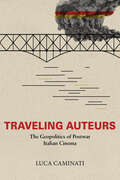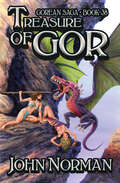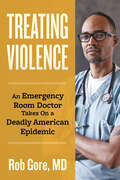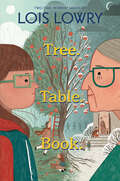- Table View
- List View
The Traitor of Arnhem: WWII’s Greatest Betrayal and the Moment That Changed History Forever
by Robert VerkaikSunday Times Bestselling author of The Traitor of Colditz Robert Verkaik reveals the incredible never-before-told story of the role played by the Cambridge Spies in the British defeat at Arnhem "Original, thought-provoking and exceedingly well written. I have not read such a convincing portrayal of the German intelligence war in Holland." Robert KershawThe end of the Second World War is in sight.Following the overwhelming victory on D-Day, Churchill, Roosevelt and Stalin all seek to shape the global future to their own ends and win the race to Berlin.The British launch Operation Market Garden, the greatest airborne operation the world has ever seen. It is a bold roll of the dice, which, if successful, will end the war in weeks. But behind the scenes, spies are working, and plans are betrayed, the operation fails and thousands of Allied soldiers die.The Traitor of Arnhem tells a never-before-told story of this iconic operation, and of the very different figures working in secret to cause the catastrophic defeat. One traitor a terrifying giant of a man, a supposed hero of the resistance who sent hundreds of fellow freedom fighters to torture and death, the other an aristocrat and an English gentleman, working from inside the heart of the Allied war effort in London. Both of them working for the Russians.Drawn from unseen records and shedding fresh light on the operation and the spies responsible for its failure, this is an incredible account of the battle that would go on to shape the twentieth century.
Transaktionales Coaching: Ein Handbuch für die Praxis
by Werner KatzengruberDas neue Buch von Werner Katzengruber befasst sich mit dem Thema Transaktionales Coaching. Dieser spezielle Coaching-Ansatz, den Katzengruber in 25 Jahren Arbeit entwickelt hat und seit 10 Jahren in seinen Coaching-Ausbildungen sowohl in Unternehmen als auch im Rahmen von Ausbildungen unterrichtet, wird umfassend in diesem Handbuch erläutert. Es ist für die Praxis geschrieben, auch wenn es eine gute Ausbildung nicht ersetzen kann. Es kann für professionelle Coaches eine Ergänzung bisher eigesetzter Methoden sein und deshalb die Wahlmöglichkeiten erweitern. Für interessierte Laien bringt es einen tieferen Einblick in diese neue Form des Coachings, die im Laufe von über zwei Jahrzehnten entwickelt und in der Praxis reichlich erprobt wurde. Die Leser finden in diesem Buch alle relevanten theoretischen Grundlagen für die Arbeit mit der Methode des Transaktionalen Coachings. Neben der nötigen Theorie liefert Werner Katzengruber auch nützliche Werkzeuge für die Anwendung.
Transcending Imagination: Artificial Intelligence and the Future of Creativity (Chapman & Hall/CRC Artificial Intelligence and Robotics Series)
by Alexander ManuImagine a world where the boundaries of creativity are not only stretched but redefined. This book serves as your guide to this new frontier, engaging general readers, tech enthusiasts, and creatives alike in the captivating interplay between human ingenuity and artificial intelligence (AI).Journey through the ground-breaking advancements in AI as they intersect with art, design, entertainment, and education. Discover how AI’s power to analyze and understand language can be harnessed to generate breathtaking visuals from mere text descriptions—a process known as text-conditional image generation. But this book goes beyond just showcasing AI’s capabilities: it delves into its transformative effects on the creative process itself. How will artists and designers adapt to a world where they co-create with machines? What are the implications of AI-generated art in educational settings? This book tackles these questions head on, offering a comprehensive view of the changing landscape of creativity.At its core, this book challenges you to rethink what’s possible in the realm of artistic expression. Manu contends that as AI evolves, mastering the art of collaboration between human and machine will become essential. More than just a look into the future, Transcending Imagination: Artificial Intelligence and the Future of Creativity is a roadmap for artists, designers, and educators eager to navigate the uncharted territory of AI-augmented creativity. It is a must-read for anyone interested in how AI might redefine the realms of art, design, and education.
La transformación total de su dinero Actualizada y Ampliada: Un plan efectivo para alcanzar paz financiera
by Dave Ramsey¿Quieres elaborar un presupuesto que realmente funcione para ti? ¿Estás preparado para transformar tu relación con el dinero? Este best seller del New York Times ha ayudado a millones de personas como tú a desarrollar hábitos cotidianos de ahorro con la ayuda del experto en finanzas personales favorito de Estados Unidos, Dave Ramsey.A estas alturas, ya has oído hablar de todos los esquemas absurdos para hacerse rico rápidamente y de las modas de dietas fiscales que te dejan con un montón de ideas extravagantes, pero ni un céntimo en el bolsillo. Si estás cansado de las mentiras y harto de falsas promesas, Dave está aquí para proporcionarte ayuda práctica y a largo plazo. Esta edición actualizada y ampliada es el plan de juego más sencillo y directo para cambiar por completo tus finanzas y, lo mejor de todo, estos principios se basan en resultados, no en fantasías. Este es el cambio financiero que estabas buscando.Este libro te dará las herramientas y el estímulo que necesitas para:Diseñar un plan infalible para saldar todas tus deudas, desde el auto hasta la casa y todo lo demás, utilizando el método de deudas de la bola de nieve.Romper con los malos hábitos y hacer cambios duraderos en tu relación con el dineroReconocer los 10 mitos más peligrosos sobre el dineroReservar dinero suficiente para gastos imprevistos y emergenciasAhorrar suficiente dinero para tu jubilación¡Vive como nadie, para que luego puedas VIVIR (y DAR) como nadie!Esta edición incluye nuevo contenido que te ayudará a abordar conflictos matrimoniales, deudas universitarias y mucho más. Cada ejemplar incluye nuevos recursos al final del libro para convertir la transformación total de su dinero en tu nueva realidad.The Total Money Makeover Updated and ExpandedDo you want to build a budget that actually works for you? Are you ready to transform your relationship with money? This New York Times bestseller has already helped millions of people just like you learn how to develop everyday money-saving habits with the help of America's favorite personal finance expert, Dave Ramsey.By now, you've already heard all of the nutty get-rich-quick schemes and the fiscal diet fads that leave you with a lot of quirky ideas but not a penny in your pocket. If you're tired of the lies and sick of the false promises, Dave is here to provide practical, long-term help. This updated edition is the simplest, most straightforward game plan for completely changing your finances. And, best of all, these principles are based on results, not pie-in-the-sky fantasies. This is the financial reset you've been looking for.This book will give you the tools and the encouragement you need to:Design a sure-fire plan for paying off all debt--from your cars to your home and everything in between using the debt snowball methodBreak bad habits and make lasting changes when it comes to your relationship with moneyRecognize the 10 most dangerous money mythsSet aside enough money to pay for unexpected expenses and emergenciesSave enough money for your retirementLive like no one else, so later you can LIVE (and GIVE) like no one else!This edition includes new content that will help you tackle marriage conflict, college debt, and so much more. Each copy also includes brand new back-of-the-book resources to help you make Total Money Makeover your new reality.
Transformation of Japanese Multinational Enterprises and Business: The 50th Anniversary of the Japan Academy of Multinational Enterprises
by Shige Makino Yasuro Uchida Tamiko KasaharaThe purpose of this book is to highlight how current successful Japanese multinational enterprises (MNEs) and companies have changed their business or business models in the past three decades. Japanese MNEs received a lot of attention from academia and industry during the 1980s and the early 1990s, and their factors for success have been compared with those of Western MNEs. Unfortunately, following the collapse of the “bubble economy” in the early 1990s, international business researchers and practitioners’ attention has turned away from Japan and its MNEs to emerging markets, notably the rapidly growing China.Japanese MNEs have faced the mature domestic economy and also have had to overcome many new challenges in the twenty-first century, such as rapid aging, depopulation, and response to new technologies. Japanese MNEs and companies today are being forced to respond to new business environments never seen in the past. The prerequisites for business activities have significantly changed from those of former Japanese companies and their management practices. Even in such a difficult situation, however, many Japanese MNEs and emerging companies have achieved steady growth and have succeeded by changing their business models. This book provides the reader with new directions for research and lessons by analyzing the challenges of Japanese multinational enterprises and emerging companies. The redirection of attention is expected to have a positive impact on the field of international business study and practice.
Transformational Creativity: Learning for a Better Future
by Robert J. Sternberg Sareh KaramiThis edited volume brings together leading scholars in diverse disciplines to share their best thinking on how creativity can be conceived of, taught for, and deployed to serve rather than undermine humanity. Transformational creativity, as defined in this book, is creativity deployed to make a positive, meaningful, and potentially enduring difference to the world. Transformational creativity is compared to transactional creativity, which is creativity deployed in search of a reward, whether externally or internally generated.
Transformational Health Communication: A New Perspective on Healthcare and Prevention
by Olaf WerderThis book advances our understanding of communicative relationships and key barriers to more effective health communication. In this, it offers a humanistic orientation of health communication as well as its social, cultural, political, ethical, and spiritual dimensions and contexts. The book therefore brings a more inclusive and integrated approach to the major challenges and opportunities in contemporary health, medicine, and wellbeing.
The Transformational Leader: How the World's Best Leaders Build Teams, Inspire Action, and Achieve Lasting Success
by Matt MayberryLead teams and organizations to unparalleled excellence through transformational leadership As we face a global leadership crisis, the decade of real-world experience and research from best-selling author and renowned thought leader Matt Mayberry in The Transformational Leader has never been more timely. Mayberry shares his experience working with hundreds of corporate leadership teams, transforming underperforming teams into top performers, and coaching executives to become the leaders their organizations need through transformational leadership's four core attributes: idealized influence, inspirational motivation, intellectual stimulation, and individualized consideration. This book is more than just a guide to a proven approach to achieving leadership success; it's a call to action that challenges you to step outside your comfort zone and create a culture where everyone feels valued, heard, and inspired. In this book, readers will learn about: Confronting the reality of the leadership crisis, and realizing that the actions that got us here won't get us to where we want to go How our dependence on technology has left leaders unprepared for disruption after disruption, including the arrival of AI Leadership principles grounded in robust research, empirical data, and proven success, such as agility, coaching, and influence The importance of inspirational leadership and how to become an inspirational leader yourself How to start influencing and impacting others regardless of rank, title, or position The Transformational Leader earns a well deserved spot on the bookshelves of executives, managers, and anyone seeking to make a bigger impact and influence others, adapt to changes in modern leadership and promote positive change in themselves and throughout their organizations.
Transformational Sales Leadership: Sales Leader Perspectives
by Christine A. Eastman Phill McGowan Beth RogersTransformational Sales Leadership: Sales Leader Perspectives offers viewpoints from 12 leaders across the global sales industry, all of which challenge conventional sales models and promote visionary ways of thinking about sales and leadership.The leaders who share their professional stories in the book are from organizations including SAP, Google, Nationwide US, and Royal Caribbean, as well as their own practices, and they represent a new breed of salespeople who are increasingly sought after by organizations which need to transform their practices. They run teams, drive analytics, and improve operational excellence, and their careers rise or fall on getting the right KPIs. Their stories address solutions to age-old sales problems, but they bring a new perspective to the sales function in the digital age. The book focuses on what sales leaders need in order to be innovative. Specifically, the book shows you how to:• Coach sales people through disruption;• Leverage the most valuable habits for success; and• Provide for meaning and purpose in the hyper-connected and volatile sales industry.If you are a sales professional looking to succeed in challenging scenarios, the journeys recounted in this book demonstrate how the landscape of sales has changed and how thinking about sales differently can help you transform your career.
Transformative AI: Responsible, Transparent, and Trustworthy AI systems (River Publishers Series in Computing and Information Science and Technology)
by Ahmed BanafaTransformative Artificial Intelligence provides a comprehensive overview of the latest trends, challenges, applications, and opportunities in the field of Artificial Intelligence. The book covers the state of the art in AI research, including machine learning, natural language processing, computer vision, and robotics, and explores how these technologies are transforming various industries and domains, such as healthcare, finance, education, and entertainment.The book also addresses the challenges that come with the widespread adoption of AI, including ethical concerns, bias, and the impact on jobs and society. It provides insights into how to mitigate these challenges and how to design AI systems that are responsible, transparent, and trustworthy.The book offers a forward-looking perspective on the future of AI, exploring the emerging trends and applications that are likely to shape the next decade of AI innovation. It also provides practical guidance for businesses and individuals on how to leverage the power of AI to create new products, services, and opportunities.Overall, the book is an essential read for anyone who wants to stay ahead of the curve in the rapidly evolving field of Artificial Intelligence and understand the impact that this transformative technology will have on our lives in the coming years.
Transforming Public Services—Combining Data and Algorithms to Fulfil Citizen’s Expectations (Intelligent Systems Reference Library #252)
by Christophe Gaie Mayuri MehtaThis book provides a precise portrayal of the current trends and future perspectives of e-Government. It outlines new approaches that optimize public services across diverse sectors. Going beyond traditional boundaries, it offers mathematical models for public services supported by convincing case studies. This book significantly enhances various government services, such as education, healthcare, safety, security, and culture. It also strongly emphasizes safeguarding citizens' personal data, ensuring privacy, and obtaining explicit consent. Tailored for students and academics, the book is an invaluable reference for teaching graduate courses in e-Government, Process Modelling, or Artificial Intelligence. Its impact extends beyond the classroom; civil servants from all domains can find practical insights to navigate the ongoing modernization of public services. Even citizens curious about the transformation in their public services can find this book enlightening. Researchers working in the area of e-Governance can use this book to discover the recent developments in e-Government.
Transgenerational Trauma: A Contemporary Introduction (Routledge Introductions to Contemporary Psychoanalysis)
by Jill Salberg Sue GrandIn this book, Jill Salberg and Sue Grand offer an overview of the psychoanalytic work on transgenerational trauma, rooting their perspective in attachment theory, and the social-ethical turn of Relational psychoanalysis.Transgenerational Trauma: A Contemporary Introduction is a cutting-edge study of trauma transmission across generations. Salberg and Grand consider how our forebears' trauma can leave a scar on our lives, our bodies, and on our world. They posit that, too often, we re-cycle the social violence that we were subjected to. Their unique approach embraces diverse psychoanalytic and psychodynamic theories, as they look at attachment, legacies of violence, and the role of witnessing in healing. Clinical and personal stories are interwoven with theory to elucidate the socio-historical positions that we inherit and live out. Social justice concerns are addressed throughout, in a mission to heal both individual and collective wounds.Transgenerational Trauma: A Contemporary Introduction offers a nuanced and comprehensive approach to this vital topic, and will be of interest to psychoanalysts, psychologists and other mental health professionals, as well as students and scholars of trauma studies, race and gender studies, sociology, conflict resolution, and others.
Transition to the Circular Economy Model: The Case of Turkey (CSR, Sustainability, Ethics & Governance)
by Natalya KetenciThis edited volume provides a multisectoral, multidisciplinary analysis of the circular economy in Turkey. The chapters delve into different segments of the economy, monitoring the progress of the transition to circularity as it is occurring. Written by experts in the circular economy, chapters touch on different aspects of the sustainability transition—from AI and entrepreneurship to luxury fashion to green finance. Chapters also refer directly to applicable UN Sustainable Development Goals, noting the progress made towards related development targets. This volume will be of use to students, academicians, experts, and professionals interested and working on different aspects of circular and green economies.
Translating Global Ideas: How Policy Legacies and Domestic Politics Shape Education Governance in Latin America (SUNY series, Education in Global Perspectives)
by Claudia Diaz-RiosInternational organizations have consistently influenced education reforms in Latin America, but not all countries have adopted the same policy recommendations. This book offers a unique comparative analysis of secondary education reforms in Chile, Argentina, and Colombia, from the 1960s to the 2010s, with a focus on three key areas: manpower planning, state-retrenchment (market-based versus active-state), and ideas about having a right to a quality education in an era of government accountability. While responding to similar policy recommendations, these countries have differed in how they have implemented decentralization, incorporated private actors, allocated authority over curriculum, and established instruments of accountability. Claudia Diaz-Rios traces the legacies of previous education policies and local struggles among stakeholders in reshaping—and sometimes rejecting—foreign recommendations. Translating Global Idea will be an invaluable resource for scholars of comparative politics and the globalization of education—particularly those interested in policy development in middle- and low-income countries, as well as practitioners invested in promoting education policy changes in Latin America.
Translation and Own-Language Use in Language Teaching: The Quest for Optimal Practice
by Eva SkopečkováThis book reconsiders the role of translation and own-language use in the EFL (English as a Foreign Language) classroom. It shows prospective teachers how to use the learners’ own language and translation optimally. The author surveys current research about the EFL classroom and presents both a theoretical framework and a didactic model for using translation and learners’ mother tongues. This is done through an action research project, assessing the proposed didactic model for optimal translation practice in English Language teaching (OTP in ELT) through its integration into teacher education. The book will be of interest to students and researchers in the areas of Translation Studies and Applied Linguistics (particularly EFL, ESL, TEFL and TESOL), as well as educators and designers of pre-service training programmes for language teachers.
Translation as Advocacy: Perspectives on Practice, Performance and Publishing (Language Acts and Worldmaking)
by VariousWhat does it mean to advocate - in translation, for translation, through translation? What does advocacy look like, for those who do the translating or for those whose work is translated? To what extent is translation itself a form of advocacy? These 'what' questions are the driving force behind this collection.Translation as Advocacy highlights the innovative ways in which translator-academics in seven different fields discuss their practice in relation to their understanding of advocacy. The book aims to encourage people to think about translators as active agents bringing new work into the receiving culture, advocating for the writers they translate, for ideas, for practices. As such, the book asserts that the act of translation is a mode of cultural production and a political intervention through which the translator, as advocate, claims a significant position in intercultural dialogue.Featuring seven interrelated chapters, the book covers themes of judgement, spaces for translation, classroom practice, collaboration, intercultural position, textuality, and voice. Each chapter explores the specific demands of different types of translation work, the specific role of each stage of the process and what advocacy means at each of these stages, for example: choosing what is translated; mediating between author and receiving culture; pitching to publishers; social interactions; framing the translation for different audiences; teaching; creating new canons; gatekeepers and prizes; dissemination; marketing and reception. This book repositions the role of the translator-academic as an activist who uses their knowledge and understanding to bring agency to the complex processes of understanding across time and space. Moving critically through the different stages that the translator-academic occupies, using the spaces for research, performance and classroom teaching as springboards for active engagement with the key preoccupations of our times, this book will highlight translation as advocacy for students, educators, audiences for translation and the translation industry.Like all the volumes in the Language Acts and Worldmaking series, the overall aim is two-fold: to challenge widely-held views about language learning as a neutral instrument of globalisation and to innovate and transform language research, teaching and learning, together with Modern Languages as an academic discipline, by foregrounding its unique form of cognition and critical engagement.Specific aims are to:· propose new ways of bridging the gaps between those who teach and research languages and those who learn and use them in everyday contexts from the professional to the personal· put research into the hands of wider audiences· share a philosophy, policy and practice of language teaching and learning which turns research into action· provide the research, experience and data to enable informed debates on current issues and attitudes in language learning, teaching and research· share knowledge across and within all levels and experiences of language learning and teaching· showcase exciting new work that derives from different types of community activity and is of practical relevance to its audiences· disseminate new research in languages that engages with diverse communities of language practitioners.
Translation as Advocacy: Perspectives on Practice, Performance and Publishing (Language Acts and Worldmaking)
by VariousWhat does it mean to advocate - in translation, for translation, through translation? What does advocacy look like, for those who do the translating or for those whose work is translated? To what extent is translation itself a form of advocacy? These 'what' questions are the driving force behind this collection.Translation as Advocacy highlights the innovative ways in which translator-academics in seven different fields discuss their practice in relation to their understanding of advocacy. The book aims to encourage people to think about translators as active agents bringing new work into the receiving culture, advocating for the writers they translate, for ideas, for practices. As such, the book asserts that the act of translation is a mode of cultural production and a political intervention through which the translator, as advocate, claims a significant position in intercultural dialogue.Featuring seven interrelated chapters, the book covers themes of judgement, spaces for translation, classroom practice, collaboration, intercultural position, textuality, and voice. Each chapter explores the specific demands of different types of translation work, the specific role of each stage of the process and what advocacy means at each of these stages, for example: choosing what is translated; mediating between author and receiving culture; pitching to publishers; social interactions; framing the translation for different audiences; teaching; creating new canons; gatekeepers and prizes; dissemination; marketing and reception. This book repositions the role of the translator-academic as an activist who uses their knowledge and understanding to bring agency to the complex processes of understanding across time and space. Moving critically through the different stages that the translator-academic occupies, using the spaces for research, performance and classroom teaching as springboards for active engagement with the key preoccupations of our times, this book will highlight translation as advocacy for students, educators, audiences for translation and the translation industry.Like all the volumes in the Language Acts and Worldmaking series, the overall aim is two-fold: to challenge widely-held views about language learning as a neutral instrument of globalisation and to innovate and transform language research, teaching and learning, together with Modern Languages as an academic discipline, by foregrounding its unique form of cognition and critical engagement.Specific aims are to:· propose new ways of bridging the gaps between those who teach and research languages and those who learn and use them in everyday contexts from the professional to the personal· put research into the hands of wider audiences· share a philosophy, policy and practice of language teaching and learning which turns research into action· provide the research, experience and data to enable informed debates on current issues and attitudes in language learning, teaching and research· share knowledge across and within all levels and experiences of language learning and teaching· showcase exciting new work that derives from different types of community activity and is of practical relevance to its audiences· disseminate new research in languages that engages with diverse communities of language practitioners.
Translocality, Entrepreneurship and Middle Class Across Eurasia: Kyrgyzstan’s ‘First Capitalists’ Since the Late Soviet Era (Routledge Series on Economic and Social Transformations in Central and Inner Asia)
by Philipp SchröderTranslocality, Entrepreneurship and Middle Class Across Eurasia is a comprehensive, multi-sited ethnography about the unfolding of capitalism across Eurasia and the advent of a new middle class since the late Soviet era. Based on extensive fieldwork, the book follows three generations of ethnic Kyrgyz in three distinct eras and sites: The early bazaar traders of Novosibirsk (Russia), the post-2000 middlemen operating in Guangzhou (China) and the ‘new entrepreneurs’ who have emerged at home in Kyrgyzstan around 2015. The book advocates translocality as an innovative concept to better understand the dialectic of mobility and emplacement in contemporary livelihoods and value chains that transgress not only political borders, but also less tangible socio-cultural boundaries. Through this lens, the chapters forcefully demonstrate how ways of business-making align or conflict with notions of ethnic belonging, diaspora, sociability or gender, in and in-between various locations.Proposing the imaginary of commercial journeys, the book documents the aspirations, adjustments and struggles of an emergent middle class, whose neoliberal subjectivity is inspired by a flexible entrepreneurial spirit of ‘Kyrgyzness’, and who navigate in a market environment that recently has been shifting towards more actor diversification, service orientation and rule-based formalization. This book will be of interest particularly to scholars in the fields of (economic) anthropology, post-socialist studies, migration, mobility and area studies with a focus on Central Asia and Eurasia.
Transnational Approaches to Bilingual and Second Language Teacher Education (Routledge Studies in Applied Linguistics)
by M. Dolores Ramírez-VerdugoThis innovative collection explores transnational approaches to bilingual teacher education from different angles, unpacking the challenges and opportunities in contemporary global bilingual programs.The book offers a thorough account of transnational pedagogical research and best practice in bilingual and second language education to advance bilingual and content and language integrated learning (CLIL) teacher education programs across international contexts, including Australia, Mexico, the United States, the United Kingdom, and around Europe. The book offers a window into better understanding issues around research outcomes on bilingual education professional development models adaptable for diverse settings, translanguaging pedagogy, creative and multimodal tools, and methodological strategies. The book also examines the challenges involved in plurilingual classrooms and formal and informal bilingual education in urban and rural areas. Influenced by the demands raised by the pandemic, some chapters discuss integrated frameworks for hybrid language learning in distance education. This volume will be of interest to students and scholars in bilingual teacher education, bilingual and second language education, and CLIL.
Transnationalisierungsräume: Schulkultur zwischen Internationalisierung und Interkulturalität (Schule und Gesellschaft #65)
by Merle Hummrich Merle Hinrichsen Paula Paz MatuteDas Buch zeigt die pädagogische Bedeutung von Globalisierungsprozessen in der Institution Schule. Diese lässt sich anhand von zwei Dimensionen markieren: der Internationalisierung von Schule und der Relevanz von ethnischer Diversität. Wie sich Schulkulturen auf diese Prozesse beziehen und wie sie damit einhergehende Anforderungen bearbeiten, wird theoretisch mit dem Konzept der Transnationalisierung aufgeschlüsselt. Zudem wird herausgearbeitet welche Möglichkeitsräume für Bildungsteilhabe sich in diesem Zusammenhang für Jugendliche eröffnen.
Trauma Informed Placemaking
by Courage, Edited by Cara Anita McKeownTrauma Informed Placemaking offers an introduction to understanding trauma and healing in place. It offers insights that researchers and practitioners can apply to their place-based practice, learning from a global cohort of place leaders and communities.The book introduces the ethos and application of the trauma-informed approach to working in place, with references to historical and contemporary trauma, including trauma caused by placemakers. It introduces the potential of place and of place practitioners to heal. Offering 20 original frameworks, toolkits and learning exercises across 33 first- and third-person chapters, multi-disciplinary insights are presented throughout. These are organised into four sections that lead the reader to an awareness of how trauma and healing operate in place. The book offers a first gathering of the current praxis in the field – how we can move from trauma in place to healing in place – and concludes with calls to action for the trauma-informed placemaking approach to be adopted.This book will be essential reading for students, researchers and practitioners interested in people and places, from artists and architects, policy makers and planners, community development workers and organisations, placemakers, to local and national governments. It will appeal to the disciplines of human geography, sociology, politics, cultural studies, psychology and to placemakers, planners and policymakers and those working in community development.
Traveling Auteurs: The Geopolitics of Postwar Italian Cinema (New Directions in National Cinemas)
by Luca CaminatiWhat tensions characterized the relationships between cinema, European Leftists, and emerging postcolonial ideologies after World War II? In Traveling Auteurs, author Luca Caminati analyzes the work of influential Italian filmmakers Roberto Rossellini, Pier Paolo Pasolini, and Michelangelo Antonioni as they engaged politically and aesthetically with the global landscapes and politics of the Cold War period. As documentaries, the films considered in this book record specific manifestations of political sensibilities of the twentieth century. As bodies of work, they reveal that the traveling auteurs who made them were symptomatic actors in complex geopolitical networks. As cultural objects reflecting and shaping contemporaneous debates, they provoke a complex afterlife at home and abroad. In the three chapters dedicated to Rossellini in India, Pasolini in Africa and the Middle East, and Antonioni in China, Caminati pays particular attention both to the reception that these films had in the countries where they were shot and to their legacies in Italian film history. As it follows the entanglements of filmmakers, artists, and activists involved as allies or direct witnesses to momentous political change, this book sheds new light on anticolonial struggles, the reaffirmation of the Non-Aligned Movement, and the consolidation of the Chinese Communist Party.
Treasure of Gor (Gorean Saga #38)
by John NormanA brilliant woman&’s dangerous discovery on Earth leads to her enslavement on the planet Gor in this long-running sci-fi fantasy series. In a remote corner of the American southwest, there is a small, private observatory. To most of the staff, it is just another stargazing facility. But a select few know its true function as a liaison point between two alien worlds: the decimated planet of the warlike Kurii, and the planet Gor, which the Kurii now covet. When the young scientist Agnes Morrison Atherton comes across an unintelligible file containing mysterious coordinates, she decides to decode them—and discovers two large, spherical, seemingly artificial objects in the asteroid belt. But it seems that Atherton&’s remarkable discovery is less than welcome. Abducted and drugged, she awakens to find herself on the planet Gor—being sold as a Gorean slave girl.
Treating Violence: An Emergency Room Doctor Takes On a Deadly American Epidemic
by Rob GoreThe inspiring story of a Black doctor who was deeply affected by the violence that plagued his Brooklyn childhood and later dedicated himself to addressing trauma and violence as public health issuesRob Gore first encountered violence when he was beaten and robbed as a 10-year old; it was treated as an inevitable fact of life, but after another brush with violence as a teen, he began to reject that prevalent attitude. As he matured and became a doctor, he grew in his determination to find treatments for what he saw not as an unavoidable fact for most people living in vulnerable, underserved neighborhoods especially, but as a public health issue that could be addressed by early intervention and solid support, beginning in the medical community. He also became deeply involved in efforts to diversify the entire field of medicine, starting with the &“front lines&” in the Emergency Department.Seeing his brother Angel and close friend Willis fall prey to the epidemic of violence with profound—and in Willis&’s case—deadly consequences, Rob began seriously researching the issue and went on to found an organization which is one of the models for successful approaches to reducing violence and protecting victims, who are disproportionately BIPOC, living in impoverished neighborhoods, or members of the LGBTQ+ community. Here he provides not only statistics, but stories of what he witnessed in NYC neighborhoods, in Atlanta, Chicago, Buffalo and even in medical work in Haiti and Kenya. His work with the Kings Against Violence Initiate (KAVI) and allied organizations is a blueprint for treating violence not as a police matter, but as a public health crisis, which can and should be addressed and substantially reduced. The people he introduces us to in these pages are not merely victims, but often advocates, paving the way for eliminating the epidemic of violence in our country.
Tree. Table. Book.
by Lois LowryFrom two-time Newbery medalist Lois Lowry comes this warm and resonant story of an unlikely friendship, which unfolds as a revelation on how we hold on to—and pass on—what matters most. <P><P>Everyone knows the two Sophies are best friends. One is in elementary school, and one is . . . well . . . in a little trouble of late. She’s elderly, sure, but she’s always been on her game, the best friend any girl struggling to fit in could ever have. The Sophies drink tea, have strong opinions about pretty much everything, and love each other dearly. Now it seems the elder Sophie is having memory problems, burning teakettles, and forgetting just about everything. It looks like her son is going to come and get her and steal her away forever. Young Sophie isn’t having that. Not one bit. So she sets out to help elder Sophie’s memory, with the aid of her neighborhood friends Ralphie and Oliver. But when she opens the floodgates of elder Sophie’s memories, she winds up listening to stories that will illustrate just how much there is to know about her dear friend, stories of war, hunger, cruelty, and ultimately love. <p> <b>New York Times Bestseller</b>
